- Home
- Alice McDermott
After This Page 2
After This Read online
Page 2
Pauline’s eyes were still on her, even as Mary found her place and set the open book upright on her desk. The goal, Sister Clare had taught them in school, was shorthand so neat and so legible that anyone can pick up your steno book and type your letters for you. So neat and so legible, she had said, smiling at them from within her wimple, that if you elope on your lunch hour, another secretary can finish your letters for you that afternoon.
She looked over her shoulder, glancing at Pauline, even smiling a little, but Pauline only tilted her head again toward Adele’s back. Mary nodded. This was the kind of moral dilemma Pauline often got her into. Mr. Someone-or-Other, Pauline had mouthed. Adele at lunch with him, crying. But Mr. Who? She turned to her typewriter, Pauline’s eyes still on her. She would like to ask “Who?”—but to do so, in that same mouthing whisper Pauline had used, would be to enter too fully into Pauline’s tale, Pauline’s bitter triumph, and, in some way, into Pauline’s unhappy life.
But Mr. Who?
This was the dilemma Pauline put her in: as much as she would like to know the story, the gossip, the whole tale, she hoped not to hear that desperate breathlessness in her own voice. As much as she wanted to know whatever it was that was worth knowing about the secrets and complications and (yes, even) failings and foibles of the people in the office—and she had to admit the few days that Pauline ever missed work were always long and dull—she did not, with equal longing, wish to be a part of the whispering spinster chorus at the edge of other, more interesting lives. She did not want to be one of the gray-haired harridans, one of those brittle and bitter middle-aged virgins who can never be sure that the world is indeed as full of deceit and ill will as they claim, or whether it’s their own tainted version of things that creates the ill will and deceit in the first place. She did not want a life drained of kindness and compassion and humor. It was as much as she had prayed for an hour ago in church, now that the war was over and she no longer prayed for the boys. She had prayed for if not a better life than this daily, lonely one, a better way to be content with it. And then the sudden windstorm, the stream of strangers either bent into it or leaning back to resist it, tears running down all their faces in this valley of tears. George putting his hand on her shoulder. God’s answer.
Never kid a kidder.
“Maybe,” she said to Pauline, not looking at her, just turning her head a bit to speak to her from across the aisle and over her shoulder. Not whispering either. “Maybe it was just the wind.”
It was the lack of a reply, clack of typewriters within the silence, that made her finally raise her eyes to Pauline’s face, which was blank, her jaw thrust forward beneath the neat pink lipstick.
“The wind,” Mary said again. “It was making everyone tear up.”
Pauline examined her face for a few seconds more, her jaw set. And then she smiled a little, not kindly, raising her eyebrows and slowly shaking her big head. “You are naïve,” she said, as if confirming something she had already spent a good deal of time discussing, elsewhere. “You really are.”
Mary shrugged. “I suppose. But that wind was making everyone tear up.”
Pauline continued to smile, shaking her head, and Mary, turning back to her work, smiled too. She had escaped the spinster chorus only to join the naïve. And here was the other part of the moral dilemma Pauline embodied. Would it have killed her to play along? To have told Pauline, Oh my! You’re kidding! What a scandal! If gossip gave Pauline pleasure why deny her? Surely there was little enough pleasure for Pauline outside of work. A mother she’d nursed through cancer, a brother she was estranged from because of a terrible wife, a small apartment and a cheap landlord and an unending series of contacts with people—a grocer, a butcher, a waitress, a salesclerk, a bus driver—who did not meet her expectations.
Feed my lambs, Jesus said. What was the cost of a little kindness toward someone who found her pleasure in being unkind? What was the good, as Sister Clare at school used to say, in loving only the lovable?
Oh my, you’re kidding, what a scandal! Would it have killed her to play along?
She whispered a quick mea culpa, resolved to be less naïve, and then let herself settle into her work, the pleasure of the speed of her fingers and the neat, dark strokes of her own shorthand, her confident spelling and punctuation, her sense of purpose and community as the busy sound of her own typewriter joined with the busy sounds of the typewriters beneath the hands of all the women in the room. This much she was sure of: if she kept busy, kept her mind to the task at hand, let herself sink into the busy industry of her job, her shoulders straight and her ankles crossed beneath her chair, her desk neat—blotter, stapler, paper clips, dictionary, the surface dusted with a tissue every morning and every afternoon—if she simply worked, worked well, efficiently, competently, then time would pass. Time would march on. Not merely the afternoon hours but the weeks and months. The lunch hour would come and then five o’clock would come and then the evening would come, and then the weekend again, and then another. Christmas would come and mad April again and lovely summer and fall. The war would begin and the war would continue and the war would end and time would pass with all that behind us now, another life (she would have put her palm to the worn gold on his belt), and all that was ahead would pass, and none of it, looking back, would seem to have been very much time at all, even though looking ahead it had seemed endless. If she kept her back straight and her ankles crossed beneath her chair and her hands over the keys, if her fingers struck them quickly and rhythmically and the sound of all their industry filled the room, and if she remembered to take some pleasure in it, the sound, the industry, the feel of Pauline’s eyes on her back, even after Pauline herself had gotten up to take dictation in one of the offices, if she found some pleasure in the changing light as the afternoon moved forward, in the fading perfumes of the other girls as they passed her desk, in the good smell of the paper, the carbon, the old building itself, then time would pass and when she stood to cover her typewriter and to run another tissue over the surface of her desk, to smile apologetically at Pauline already in her hat and coat and waiting like the schoolgirl she surely must once have been for the stroke of five (adding, in her hissed stage whisper, “This isn’t the first time they’ve been seen together like that”), she could tell herself another day gone and not so bad at that and what else to do when you’re a single girl of thirty still at home, the war over and no prospects in sight, your body not meant for mortal sin or a man’s attention or childbearing, either, it would seem, what to do but accept it and go on—a walk to the subway, the air chilled even further without the sun but the wind not nearly so bad as it was, and the ten-stop ride among the crowd of other office workers, and then the walk home, spears of crocus and daffodil rising out of the hard dirt around the caged trees and along the brick foundations, not so bad.
She unwrapped the lamb chops from their white butcher paper and peeled a few potatoes and opened a can of peas. Her father came in with the newspaper under his arm and then swatted her on the hip with it as he went to the table to sit down. And then Jimmy came in still wearing his overcoat to say, “What’s this? What’s this?” And then told their father with his hands on his hips that George was taking “our miss here” out to dinner. And her father lowered the paper and smiled at her—his round, florid face and his sparse white hair which he no longer bothered to slick down with water or tonic, being mostly housebound and hardly out of his slippers all week long—and only began to pout a little, Jimmy too, when she set the plate of lamb chops and the mint jelly and the mashed potatoes and peas in their bowls on the table and then pulled off her apron and said, “I’m just going to take a shower.”
“Be sure to put it back,” Jimmy said and winked at her father, but she was barely out of the small kitchen before the two men faced each other across the table, across the empty place where she usually sat between them, and glimpsed the possibility of a change in their routine.
George took her arm again, walking
across the sidewalk to his car. He opened the car door for her and once she was inside, he leaned down to smile through the glass. And once inside himself, he took the wheel and told her without prompting that they were going to a steak house downtown that a friend had recommended. His hands on the steering wheel were short and clean and it slowly dawned on her that his fingernails were buffed, perhaps even manicured. She looked at his ear, under the brim of his hat. Sometime since this afternoon, he’d stopped for a haircut, too. The thought flattered her, even made her shy as he talked about this pal of his who knew from steak houses and fish markets, a connoisseur of mushrooms and artichokes who actually ordered cheese for dessert, his tastes were so refined. He took his eyes from the road for a minute to look at her, smiling again, laughing as he spoke, being charming even as she, smiling back at him, found herself growing demure.
In the restaurant, he told her everything about himself that he had already told them over dinners at home—a Midwest childhood, a kidney condition that kept him out of the service, a stint at the Navy Yard before the job at the brewery. She merely nodded, trying to look attentive but actually studying his face, which was pleasant enough, studying his table manners, which were passable but in need of certain refinements—he buttered the back of his entire roll and put the half-bitten piece on the edge of his dinner plate.
In the car coming home he kept his hand on the seat between them. She wished out loud for the weekend and then told him a little about Pauline, and the story of Adele and Mr. Someone-or-Other. He nodded, his eyes on the road. She wasn’t sure he followed, or had any interest. She wondered if he thought this was girlish gossip that she was foolishly telling him, if he had missed her point that girlish gossip was what she had sought to avoid. The uncertainty that had clouded his face this afternoon in the moment after he’d asked her out to dinner was now a tangible presence in the car as they approached her building and the time for some kind of conclusion to this odd impulse of his had finally come.
“Thanks so much for this,” she said as he pulled to the curb. She put the strap of her pocketbook over her arm, put her hand on the door handle. “You really didn’t have to.”
He seemed to rouse himself from a growing disengagement. “I wanted to,” he said. “It was nice to have a chance to get to know you better,” he added, although she could not imagine a single thing he might have learned. He leaned toward her, slowly raising his hand to his hat and then doffing it quickly, as if taken by surprise, when she leaned forward to meet him. And this, she thought, of course, was what the whole evening had been for, the delightful feel of his rough cheek against her fingertips, his hands and lips and warm breath. The lingering taste of coffee in his mouth. Something awkward and lovely (a drumming on the roof, was it rain?) and absurd about Jimmy’s pal George moving his arm around her waist, pressing his hat into her back, and her fingers finding the newly trimmed border of his hair. All that trying to be charming and trying to be demure and hoping to look attentive and to speak well and wondering how this strange impulse of his will come to a conclusion put aside now that they had agreed, finally, that this, after all, was simply what they’d wanted. The warmth of it, the moment’s respite.
Jimmy was in the living room, in his undershirt, reading the Daily News beside a single lamp. He lowered the paper and began to fold it neatly as soon as she came in, but asked only where she had eaten before he said good night. She went into the kitchen and was surprised to find the dishes, including the serving bowls, washed and drying in the dish rack and the remaining lamb chop, a scoop of mashed potatoes, and a handful of peas on a plate in the icebox, another turned over it. She wondered at their logic: Had they thought she’d be too nervous to eat with George? Or that she’d just nibble, hoping to appear dainty, like Scarlett O’Hara at Twelve Oaks? She decided they simply didn’t know what to do with her portion: something ungenerous about eating it themselves, something unkind about throwing it away. She wiped down the kitchen table and the counter and swept the floor, and then ran into Jimmy in the hallway, now in T-shirt and pajama bottoms, as he came out of the bathroom. He held the glass of water he would put by his bedside, on the nightstand between his bed and their father’s.
“Sleep tight,” he whispered, and then surprised her by putting his arms around her, the glass at her back. “Our Mary Rose,” he said, and kissed her head, as if he were bidding her a fond farewell.
She laughed. There could be worse lives than this lonely one. There could be life married to someone like George.
In her own room, she pulled back the covers, took the rosary beads from under her pillow, and got into bed. Joyful, Sorrowful, Glorious Mysteries. She chose the Joyful for this night—another day gone, not so bad, a date no less—but in her weariness forgot where she had begun and followed the Visitation with Jesus being lost in the Temple and then Mary’s assumption into heaven, wondering all the while just who—Mr. Who?—had wiped the tear from Adele’s eye.
The next afternoon she lit her candle and said her prayer, and then playfully linked arms with poor Pauline who always waited at the back of the church, no longer on speaking terms with Catholicism. It was a lovely afternoon, a bright afternoon in spring that even Pauline was taking some pleasure in (there were her good new shoes in a rich burgundy, a fresh Danish she’d had this morning at coffee break, a blouse she had made last night from a remnant of green silk and placed on Mary’s desk this morning, because, she’d said, it would only fit someone without much of a chest). There wasn’t a tear to be seen on the faces of the men and women in the street as the two of them walked down to Schrafft’s. Only him, again, leaning by the door, suit jacket and fedora, the sunlight striking gold, the leg he had favored bent back and pressed against the building. He was smoking a cigarette. He was the handsomest man on the block. He was waiting for her.
She felt Pauline beside her, stiffening against his greeting. She thought, giving him her name, how there was a trace of sorrow in every joy. She thought, as he held the door, smiling at her, Poor George.
The day before Mary and John Keane were married, Pauline tripped on the sidewalk outside her building (the landlord was somehow to blame) and broke her wrist. When she appears in photographs of that day, her dark suit is slashed by a white sling, and under her stylish turban, her big powdered face is dignified, carved in ivory, only a certain determination about the jaw and the mouth betraying a reluctant smile.
THE RUSH HOUR that Friday night began with a wet snow. Sitting at her typewriter in her lambskin coat and hat, Pauline saw the first fat flakes pass like small shadows across the office window and expressed her disapproval of nature itself with a loud clucking of the tongue. Impatiently, she leaned down to pull her folded rain boots from the bottom of the desk drawer. Throughout the typing pool all the girls began to do the same.
An hour later, crossing the lobby of their apartment building, Mary Keane felt her own transparent booties squeak and slip on the linoleum floor, which was so streaked with mud and melting snow you’d think the steady stream of residents tramping home had crossed ditches and fields, not merely the four blocks of wet sidewalk between here and the subway. She carried her umbrella and a white bakery box now dappled with gray—a pair of apple turnovers for tomorrow’s breakfast.
The elevator was open and inside it a young man in a dark overcoat was holding the bucking door with his forearm.
Double-stepping, still uncertain of her traction, she hurried to reach it. “Gee, thanks,” she said, although, after a lifetime in her old walk-up, she still preferred to take the stairs. He dropped his arm as soon as she had stepped inside and some impatience in his posture conveyed the idea that he would have dropped his arm at that precise moment had she stepped inside or not.
“Floor?” he said, turning only his profile toward her. He wore a dark fedora and had a roman nose.
“Five,” she said. And then added, “Thanks again.”
Gloveless, he pressed a long pale finger into the elevator button that w
as a faded shade of ivory, seemed even to grind it in a bit, and then, stepping back, placed the hand into the pocket of his oversize coat.
They both stared into the lobby’s baleful yellow light. Tamed, the doors now remained impassively open. Through them, she saw another pair of residents—another young couple—swing into the lobby, laughing and shaking wet snow from their shoulders and hats. He pressed the button again, with his thumb this time, banging it a bit as if to make a stronger point. The elevator suddenly shook itself, coming to, and the doors slowly closed before the newcomers could look up from their clothes to cry, Wait.
Alone together in the little box that smelled of his wet wool and her wet fur and the various beginnings of other people’s dinners, he glanced at her and then politely doffed his hat, placing it over his heart as if for the national anthem. He raised his eyes to the numbers above the door.
“Some weather,” she said. He merely, barely, nodded. “Who knew it would snow?” she said.
Now he shook his head, shrugging a little, a wordless, No one knew.
He was pale as salt. Although along his jaw there was, beneath the pale skin, the outline of a black beard. His hair was cut short, but it was clear that left to its own devices it would curve, and then curl. He was not tall, but the fingers that held his hat against his overcoat were exceptionally long and thin. She saw how they moved one at a time against the dark brown felt, pressing themselves against the fabric almost imperceptibly, like a pulse under the skin. The way a child’s fingers might move in sleep.
At the third floor, the elevator stopped haltingly, bouncing them both on the balls of their feet. The doors slid open to show the familiar green walls, the chipped ledge and decorative mirror that marked each floor. A smell of frying onions.
They both looked out at the empty hallway and then she turned to him to say, “No one,” as if this were indeed a small mystery.

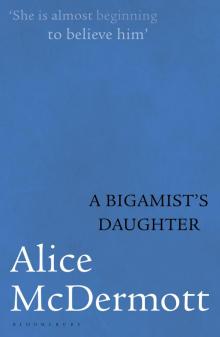 A Bigamist's Daughter
A Bigamist's Daughter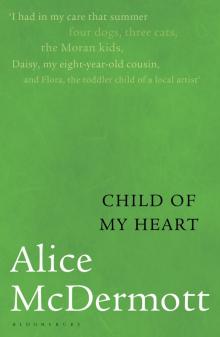 Child of My Heart
Child of My Heart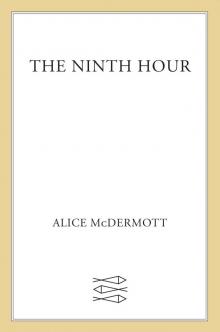 The Ninth Hour
The Ninth Hour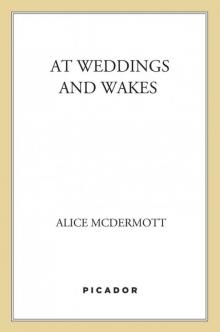 At Weddings and Wakes
At Weddings and Wakes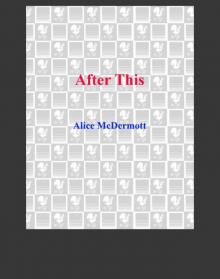 After This
After This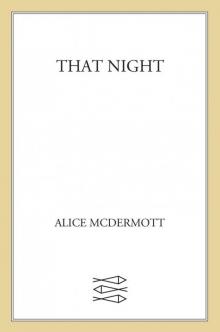 That Night
That Night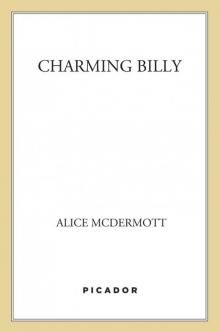 Charming Billy
Charming Billy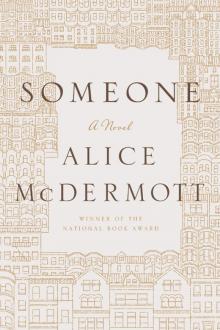 Someone
Someone